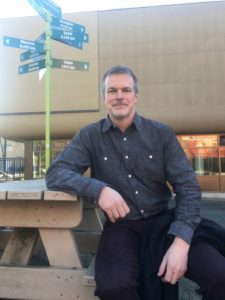Know Your Profs is an ongoing series of profiles on the instructors at Camosun College. Every issue we ask a different instructor at Camosun the same 10 questions in an attempt to get to know them a little better. Do you have an instructor that you want to see interviewed in the paper? Maybe you want to know more about one of your teachers, but you’re too busy, or shy, to ask? Email editor@nexusnewspaper.com and we’ll add your instructor to our list of teachers to talk to.
This issue we talked to Camosun Marketing instructor Glen Allen about his love of Japanese food, his impact on his students, and that one time a dog literally ate his students’ homework.
1: What do you teach and how long have you been at Camosun?
I started as a term instructor in the school of Business in 2007, then moved to Camosun International, where I managed all of the college’s short-term international programs from 2009 to 2012. I returned to Business as a full-time instructor six years ago and have taught courses across three different departments: Marketing, Management, and Applied Business Technology.

2: What do you personally get out of teaching?
I’ve been immersed in the education sector my entire career, with significant stints as teacher, administrator, and even entrepreneur. What I like most about teaching is the opportunity to channel some of the teachers and professors who made lasting impressions on my educational experience—and life—and to do my best to impact my own students in a similar way.
3: What’s one thing you wish your students knew about you?
I am a huge supporter of international student mobility. In my life, I’ve had the good fortune to study, work, and travel across much of the globe. I empathize with students who have come to Canada for the first time and who struggle with cultural, linguistic, culinary, and other challenges on top of their academic studies; at the same time, I encourage our domestic students to get out and see the world as soon as they are able.
4: What’s one thing you wish they didn’t know about you?
On more than one occasion I’ve marked assignments from the beach at Beacon Hill Park.
5: What’s the best thing that’s happened to you as a teacher here?
I love hearing from former students who drop by a year or two after their course is done to tell me that they never realized how useful the course content was until they had the opportunity to use it in the workplace.
6: What’s the worst thing that’s happened to you as a teacher here?
I had my marketing class submit an assignment that involved samples of food packaging. I was dog-sitting for a friend at the time and left the box of assignments on the floor when I went to work the next morning. The following day I had to break the news to some of my students that while their assignments had been received, the dog had literally eaten their homework.
7: What do you see in the future of post-secondary education?
To echo the words of [Camosun English instructor] Kelly Pitman a few years back, I’m concerned that the focus by some on post-secondary education as a tool for meaningful employment—job training—is overshadowing the idea of education as a tool for teaching people how to be critical thinkers, problem solvers, and responsible global citizens. If the focus were more firmly placed on the latter, I think society may be better equipped to deal with solving systemic challenges such as poverty, racism, and underemployment.
8: What do you do to relax on the weekends?
Besides spending quality time with my family, I am a competitive curler. Our team competes on the World Curling Tour and started this season ranked number four in BC and number 79 in the world. Competitive sport may not always be relaxing, but I find it therapeutic in that it gives me an opportunity to tune out whatever other stresses may be going on in the background.
9: What is your favourite meal?
Just about anything Japanese. I lived for two years in Hokkaido and am a big sucker for ramen, okonomiyaki, katsudon, jingisukan, shabu shabu…
10: What’s your biggest pet peeve?
Students who don’t respect an instructor’s need to sort out waitlists during the first week of classes. If you don’t plan to be in a course, please withdraw ASAP—preferably before the course starts—in order to help out those students who really need to get in.
